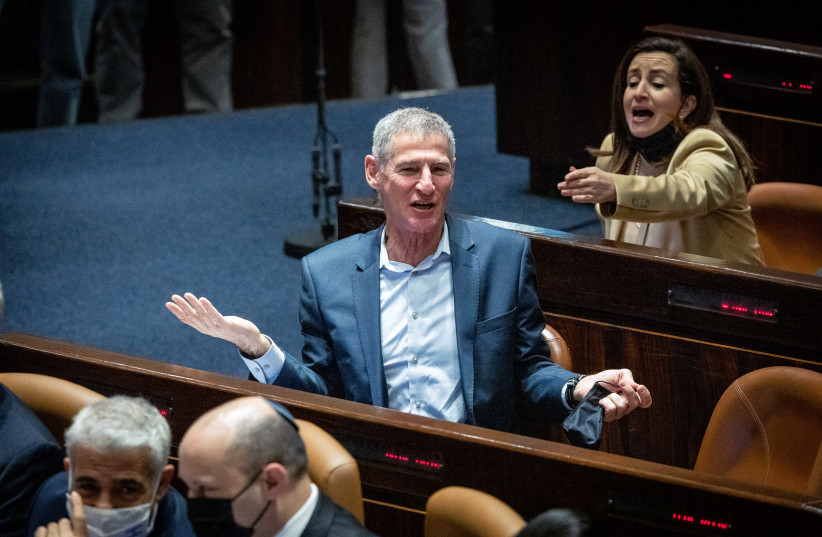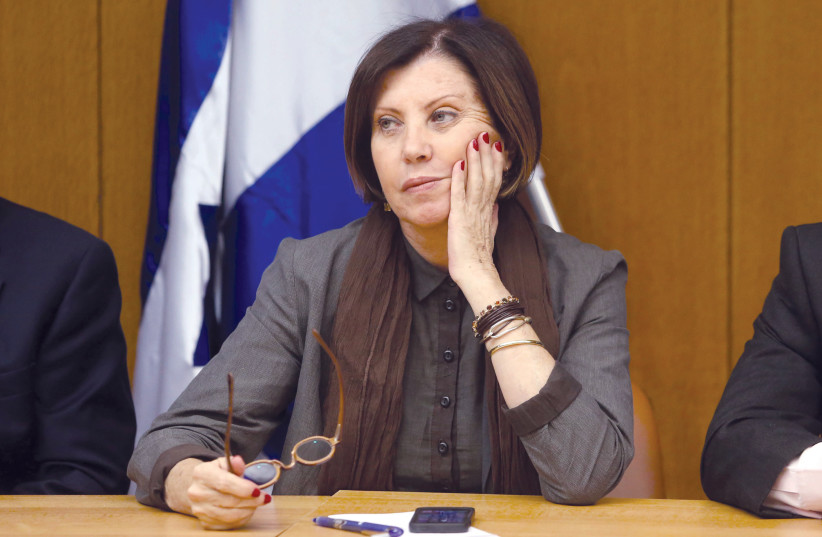Meretz is at a crossroads.
The party began the election season polling consistently under the electoral threshold, and it has averaged fewer than 4.5 mandates in the last eight elections.
In two of the four elections in the recent cycle, Meretz joined mergers to pass the electoral threshold, and nearly all of its MKs want to do so again.
The two candidates for the Meretz leadership, former MK Zehava Galon and Deputy Economy Minister Yair Golan, represent two sharply different visions for the future of the party.
According to Golan, there are two major problems with the party in its current form, the first ideological and the second tactical.
First, in terms of ideology, the party has become irrelevant, Golan claims. It spends most of its energy on issues such as climate change and LGBT rights, which, no matter how important, are not part of the discourse among the larger parties.
“Zehava [Galon]’s basic idea, which says that Meretz is an opposition party and that Meretz is exclusive and holds severe entry exams to whoever wants to join, including me, is an approach that you cannot make progress with,” Golan told The Jerusalem Post. “And then what happens is that when you begin to deal with [such] topics, which are important – I don’t think LGBT rights or the environment are unimportant – you limit yourself to esoterica and do not connect with the Israeli public.”
"When you begin to deal with [LGBT rights or the environment]...you limit yourself and do not connect with the Israeli public"
Deputy Economy Minister Yair Golan

Golan: Meretz must reevaluate focus
Instead, he said, the party should focus on four things: separation from the Palestinians, enlarging the welfare system, separating religion and state, and providing Israel’s Arab citizens with equal opportunities. None of these are niche issues, and to have any say on them, the party must grow, he added.
It is also imperative that Meretz not hesitate to define itself as Zionist, Golan said. He has argued in the past that not only is he a Zionist, but he represents the real version of Zionism, whose leaders in its earlier stages understood the need to separate from the Palestinians to ensure that the state remain Jewish.
“When the head of the party says that Meretz is not Zionist, that Meretz fights against Israeli colonialism in the [West Bank] territories… no one wants to join us,” he said.
THE SECOND problem with Meretz is its tactics, Golan said. In a recent Channel 13 interview, he said the party needs to “go on the offensive” to attract more voters. He described himself as a believer in “practical Zionism” and said when it comes to truly “serious” issues, such as the Israeli-Palestinian conflict, Meretz suffices with slogans and is not taken seriously enough.
“It is not enough to shout, ‘Stop the occupation.’ We need to explain how we are going to stop the occupation,” Golan told KAN News on Sunday. To launch an efficient attack on the Right, Meretz needs to initiate, plan and show that it means business, even on issues that, for him, are second tier, such as climate change, he said.
Golan: Mertz talks, not acts, on climate change
“Israel’s influence on the climate crisis is negligible,” Golan wrote on Twitter on Sunday. “The focus on climate in Israel should be in preparing infrastructure for extreme heat waves and safeguarding our national parks. To talk about climate as if Israel is a superpower is to talk in slogans instead of carrying out actions that directly affect the Israeli citizen.”
Golan was attacked for his comments, with voters accusing him of not caring enough. In response, he gave an example of what he meant by “go on the offensive” and posted a six-point plan on Facebook about how he intends to counter the climate’s effects in Israel.
A shift in ideological priority along with a change in tactics is the key to success, Golan said.
“So many voters come to me and say, ‘Yalla, enough,’” he told the Post. “Let’s return to the days of the Left of old, a Left that wants to govern, knows governance and yearns for it and doesn’t hold purity tests, that invites everyone to join and is Zionist and patriotic… let’s speak positively in a way that will bring back voters who are in Yesh Atid and Blue and White. Come home, and we will build a governing party, a party that wants to grow and can grow and tests itself on only one thing: whether it grew or not.”

Zehava Galon's vision for Meretz
GALON’S VISION is completely different.
Voters must decide whether “they want a conservative Meretz that tries to dress up as something else or a progressive Meretz,” she told KAN News on Sunday.
“Do they want a conservative Meretz that will blur its positions and move to the Center or a progressive party, which at its core want to take Israel forward [and deal with] issues such as climate, the environment, women’s rights, violence against women and LGBT rights,” Galon said.
These issues go hand in hand with the fight to end the occupation, and they have always been Meretz’s platform, she said, adding that if Golan wants to move to the Center, there are enough other parties there for him to choose from.
That Meretz is a niche party is exactly why it is important, Galon said. Its founders broke away from the Labor movement because a voice was needed that clearly stood up for human rights, she told KAN News. She said she was willing to merge with Labor for the good of the anti-Netanyahu bloc, but such a merger would only be technical, and Meretz would retain its separate identity. In any event, Galon said she was confident the party would pass the electoral threshold on its own.
In a period where the ideological differences between some parties are negligible – let alone between primary candidates – the fight unfolding in Meretz is substantial, and it will determine the direction the party takes in the foreseeable future.
